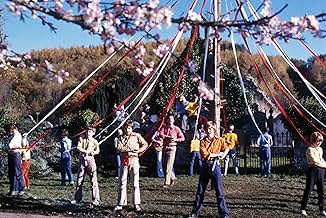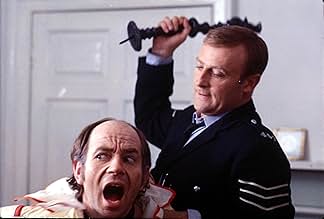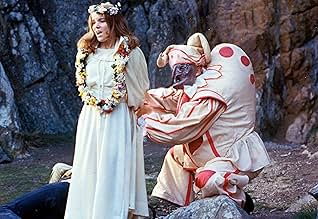Un sergent de police est envoyé dans un village insulaire écossais à la recherche d'une fille disparue qui, selon les habitants, n'aurait jamais existé. Plus étrange encore sont les rites qu... Tout lireUn sergent de police est envoyé dans un village insulaire écossais à la recherche d'une fille disparue qui, selon les habitants, n'aurait jamais existé. Plus étrange encore sont les rites qui s'y déroulent.Un sergent de police est envoyé dans un village insulaire écossais à la recherche d'une fille disparue qui, selon les habitants, n'aurait jamais existé. Plus étrange encore sont les rites qui s'y déroulent.
- Prix
- 3 victoires et 6 nominations au total
Irene Sunters
- May Morrison
- (as Irene Sunter)
Barbara Rafferty
- Woman with Baby
- (as Barbara Ann Brown)
Juliet Cadzow
- Villager on Summerisle
- (as Juliette Cadzow)
Histoire
Le saviez-vous
- AnecdotesSir Christopher Lee said that he considers this to be one of his greatest ever roles.
- GaffesMost of the "naked" girls dancing in the stone circle and jumping over the fire are wearing flesh-colored body stockings. (The film was shot in autumn and not in spring as it was set, and thus was very cold.)
- Citations
Lord Summerisle: Do sit down, Sergeant. Shocks are so much better absorbed with the knees bent.
- Générique farfelu[Short Version only] A message from the producers thanks "The Lord Summerisle and the people of his island" for co-operating in the making of the film. This is despite both the lord and the island being totally fictitious.
- Autres versionsA dual DVD set in a burnt wooden box was released in 2001 by Anchor Bay. It has the standard 88 (or 87) minute Theatrical Version. It also has a 99 minute Extended Version. This also has the events in chronological order (unlike the 88 min version). Unlike the 95 minute version it does have footage prior to Sgt. Howie's arrival on Summerisle, including him as a Preacher.
- ConnexionsFeatured in Scream Greats, Vol. 2: Satanism and Witchcraft (1986)
- Bandes originalesCorn Rigs
Written by Paul Giovanni
Performed by Paul Giovanni
[played over the latter half of the opening credits]
Commentaire en vedette
The best British horror film ever made? Probably, yes. The best horror film ever made? No. The best occult thriller ever? Quite possibly.
The film was in part conceived as a vehicle for Christopher Lee to get away from his Hammer roles and give him a chance to demonstrate that, yes, he could actually act. Perversely, however, the film is in many ways homage to the films produced by the Hammer studio and is at the same time their antithesis.
Although Lee's Lord Summerisle was certainly a stronger character than his Hammer caricatures, and was suitably sincere and sinister, it was left to Edward Woodward's bumbling, pious Highland Police Sergeant to carry the film.
The rest of the cast are not as strong as the two central characters. Famously, it was always suggested that Britt Ekland's voice was overdubbed for the entire film. Robin Hardy has now denied that, stating that only her singing was dubbed. Even if the other actors' performances fail to match those of Woodward and Lee, somehow, it doesn't detract from the film.
Almost as famous as The Wicker Man itself are the stories surrounding the film. The version first released was almost completely butchered from an original, almost grandiose cut of 102 minutes to a more concise 87. Christopher Lee has always maintained that this was a crime against the greatest piece of art with which he had ever been involved. The original negatives were then accidentally thrown out!
When a fuller version finally surfaced in 2001, Lee's contentions were (at least in part) proved. The film was overall improved, and save for a couple of points of rather clumsy editing (the flashbacks Edward Woodward has as the penny drops spring to mind) and the pointless scenes before the flight to the island, it ran more smoothly and made more sense.
The film's greatest asset comes through in whichever version you actually see. The eerie sinister atmosphere never fails to be conveyed. Somehow, the fictitious Scottish island setting of Summerisle, which could so easily turn twee at any moment steers clear of the territory occupied by Brigadoon or the now happily deceased BBC TV drama 'Monarch of the Glen'.
The setting's remoteness, which could have been its worst enemy, is actually its greatest ally.
Perhaps the most interesting thing about the film, however, is the way that it steadfastly refuses to fit precisely into any genre. It is all at once a horror, a thriller and even a musical! Unbelievably, these things come together and fit into the film.
The music in The Wicker Man is unique, always adding just the right tone of eeriness or bawdiness to proceedings. A strange mix of elements including traditional folk music, it's as innovative and interesting as the soundtracks to Blade Runner, or The Virgin Suicides. The opening title sequence to the tune of Corn Rigs succeeds in transporting you with the plane over the remote coastal peninsulas and out into the Irish Sea towards Summerisle.
My only criticism of the film (and I really am nitpicking here) is the way it goes about establishing Sergeant Howie's Christianity. I can't conceive of the Howie character adhering to any religion other than one of the obscure forms of Presbyterian Protestantism practised in parts of the Highlands of Scotland. These scenes contain an apparent reverence for the sacraments that appears more Catholic in nature. This distinction in religious backgrounds is important to understanding Howie's attitudes. Nevertheless, I am truly nitpicking when I make this criticism!
But what ultimately makes this film is its ending. Without giving the game away for those who have not yet seen the film, it is inevitable, and yet wholly unexpected when it finally comes.
The Wicker Man would be a classic of its genre - if it had a genre. Instead, it has to be ranked as a classic film.
The film was in part conceived as a vehicle for Christopher Lee to get away from his Hammer roles and give him a chance to demonstrate that, yes, he could actually act. Perversely, however, the film is in many ways homage to the films produced by the Hammer studio and is at the same time their antithesis.
Although Lee's Lord Summerisle was certainly a stronger character than his Hammer caricatures, and was suitably sincere and sinister, it was left to Edward Woodward's bumbling, pious Highland Police Sergeant to carry the film.
The rest of the cast are not as strong as the two central characters. Famously, it was always suggested that Britt Ekland's voice was overdubbed for the entire film. Robin Hardy has now denied that, stating that only her singing was dubbed. Even if the other actors' performances fail to match those of Woodward and Lee, somehow, it doesn't detract from the film.
Almost as famous as The Wicker Man itself are the stories surrounding the film. The version first released was almost completely butchered from an original, almost grandiose cut of 102 minutes to a more concise 87. Christopher Lee has always maintained that this was a crime against the greatest piece of art with which he had ever been involved. The original negatives were then accidentally thrown out!
When a fuller version finally surfaced in 2001, Lee's contentions were (at least in part) proved. The film was overall improved, and save for a couple of points of rather clumsy editing (the flashbacks Edward Woodward has as the penny drops spring to mind) and the pointless scenes before the flight to the island, it ran more smoothly and made more sense.
The film's greatest asset comes through in whichever version you actually see. The eerie sinister atmosphere never fails to be conveyed. Somehow, the fictitious Scottish island setting of Summerisle, which could so easily turn twee at any moment steers clear of the territory occupied by Brigadoon or the now happily deceased BBC TV drama 'Monarch of the Glen'.
The setting's remoteness, which could have been its worst enemy, is actually its greatest ally.
Perhaps the most interesting thing about the film, however, is the way that it steadfastly refuses to fit precisely into any genre. It is all at once a horror, a thriller and even a musical! Unbelievably, these things come together and fit into the film.
The music in The Wicker Man is unique, always adding just the right tone of eeriness or bawdiness to proceedings. A strange mix of elements including traditional folk music, it's as innovative and interesting as the soundtracks to Blade Runner, or The Virgin Suicides. The opening title sequence to the tune of Corn Rigs succeeds in transporting you with the plane over the remote coastal peninsulas and out into the Irish Sea towards Summerisle.
My only criticism of the film (and I really am nitpicking here) is the way it goes about establishing Sergeant Howie's Christianity. I can't conceive of the Howie character adhering to any religion other than one of the obscure forms of Presbyterian Protestantism practised in parts of the Highlands of Scotland. These scenes contain an apparent reverence for the sacraments that appears more Catholic in nature. This distinction in religious backgrounds is important to understanding Howie's attitudes. Nevertheless, I am truly nitpicking when I make this criticism!
But what ultimately makes this film is its ending. Without giving the game away for those who have not yet seen the film, it is inevitable, and yet wholly unexpected when it finally comes.
The Wicker Man would be a classic of its genre - if it had a genre. Instead, it has to be ranked as a classic film.
- united100
- 18 sept. 2003
- Lien permanent
Meilleurs choix
Connectez-vous pour évaluer et surveiller les recommandations personnalisées
Détails
- Date de sortie
- Pays d’origine
- Site officiel
- Langue
- Aussi connu sous le nom de
- The Wicker Man
- Lieux de tournage
- Culzean Castle, Maybole, South Ayrshire, Écosse, Royaume-Uni(Exteriors ofLord Summerisle's island mansion)
- société de production
- Consultez plus de crédits d'entreprise sur IMDbPro
Box-office
- Budget
- 810 000 $ US (estimation)
- Brut – États-Unis et Canada
- 148 882 $ US
- Fin de semaine d'ouverture – États-Unis et Canada
- 5 493 $ US
- 29 sept. 2013
- Brut – à l'échelle mondiale
- 528 514 $ US
- Durée1 heure 28 minutes
- Mixage
Contribuer à cette page
Suggérer une modification ou ajouter du contenu manquant


































